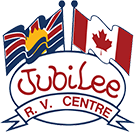HOW TO TACKLE RV CONDENSATION
 Dealing with moisture in your RV early is extremely important, so we created this guide to help our customers do just that. We’ll discuss how humidity and moisture affect your trailer, as well as how to deal with them (using both on-grid and off-grid techniques). If you have water damage in your RV, our team of technicians can get your travel trailer, fifth wheel, camper, or motorhome back into good shape. Read on to learn more, and stop by Jubilee RV Centre with any questions you might have. We’re located in Kamloops, British Columbia, and we proudly serve the areas of Vancouver, Kelowna, and Prince George, British Columbia.
Dealing with moisture in your RV early is extremely important, so we created this guide to help our customers do just that. We’ll discuss how humidity and moisture affect your trailer, as well as how to deal with them (using both on-grid and off-grid techniques). If you have water damage in your RV, our team of technicians can get your travel trailer, fifth wheel, camper, or motorhome back into good shape. Read on to learn more, and stop by Jubilee RV Centre with any questions you might have. We’re located in Kamloops, British Columbia, and we proudly serve the areas of Vancouver, Kelowna, and Prince George, British Columbia.
HUMIDITY & MOISTURE
Moisture in your RV won’t be a problem until it is, and when it becomes a problem, you’ll wish you had dealt with it earlier. After all, water itself is harmless enough. Seeing a little moisture collecting on the walls might not seem like a problem. But water can hasten the growth of fungi like mildew and mold, which will cause huge problems. Water can also damage materials in your RV, and if it freezes, it can do even more damage.
It’s best to maintain a humidity level between 30% and 50% for optimal comfort. In this range, you won’t have to worry about condensation and water damage.
GETTING MOISTURE UNDER CONTROL
Moisture is a natural part of life in an RV, but it’s important to keep moisture levels under control. To do this, you’ll need to identify where the moisture is coming from. Tasks such as cooking, cleaning, and showering can all put out serious amounts of moisture. A pot of boiling water can dramatically shift the amount of humidity in the air in a matter of moments. Even a hot shower will kick out enough humidity to cause problems. That’s not to say you should stop cooking and showering, but being aware of the tasks that create humidity and condensation will allow you to mitigate their effects.
Any structural damage in your RV can lead to water entering your RV. A leak in your roof can lead to having serious amounts of water in your RV. If you see moisture in a specific place, there’s a good chance that you have some structural damage you might not be aware of.
THE SIMPLE WAY TO DEAL WITH MOISTURE
If your RV doesn’t have any structural damage and your condensation problems are coming from everyday life, you can reduce the total humidity using a dehumidifier. Dehumidifiers can suck major amounts of water out of the air and keep your RV’s humidity much more balanced. Using a dehumidifier basically requires a connection to the energy grid because it’s too energy-intensive for most solar energy systems or generators. For larger RVs with multiple rooms or living spaces, you might need more than one dehumidifier.
OFF-THE-GRID MOISTURE REMOVAL
If you’re not connected to the energy grid, there are still a few tricks you can use to keep humidity down. Try keeping the vent above the bathroom and kitchen open so that humidity from these regions will rise and exit the trailer. If you really want to handle the moisture, use desiccant crystals. Desiccant crystals are essentially the same substance that you find in little packets when you buy a new pair of shoes. They’re designed to absorb huge amounts of moisture. They can be purchased online or at many home improvement stores. A few dishes of desiccant crystals will keep your trailer drier for months.
Do you need maintenance on your RV? Stop by Jubilee RV Centre in Kamloops, British Columbia. We proudly serve the areas of Vancouver, Kelowna, and Prince George, British Columbia. Let our skilled technicians handle any water damage or other problems that your RV has.

